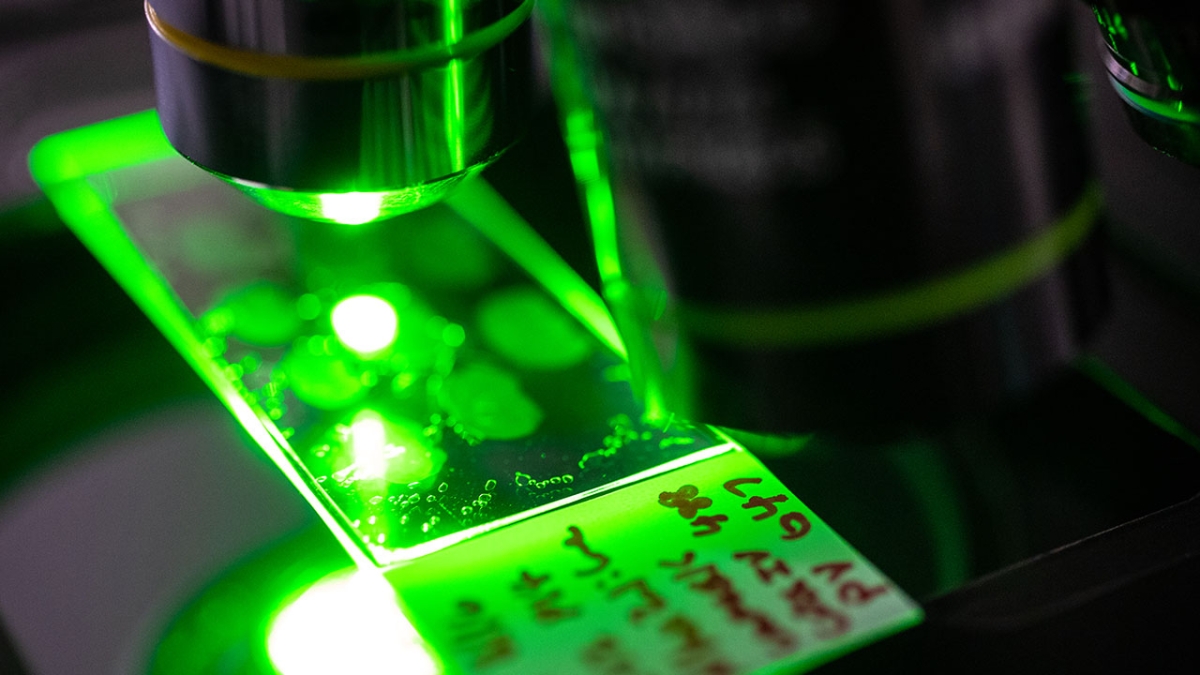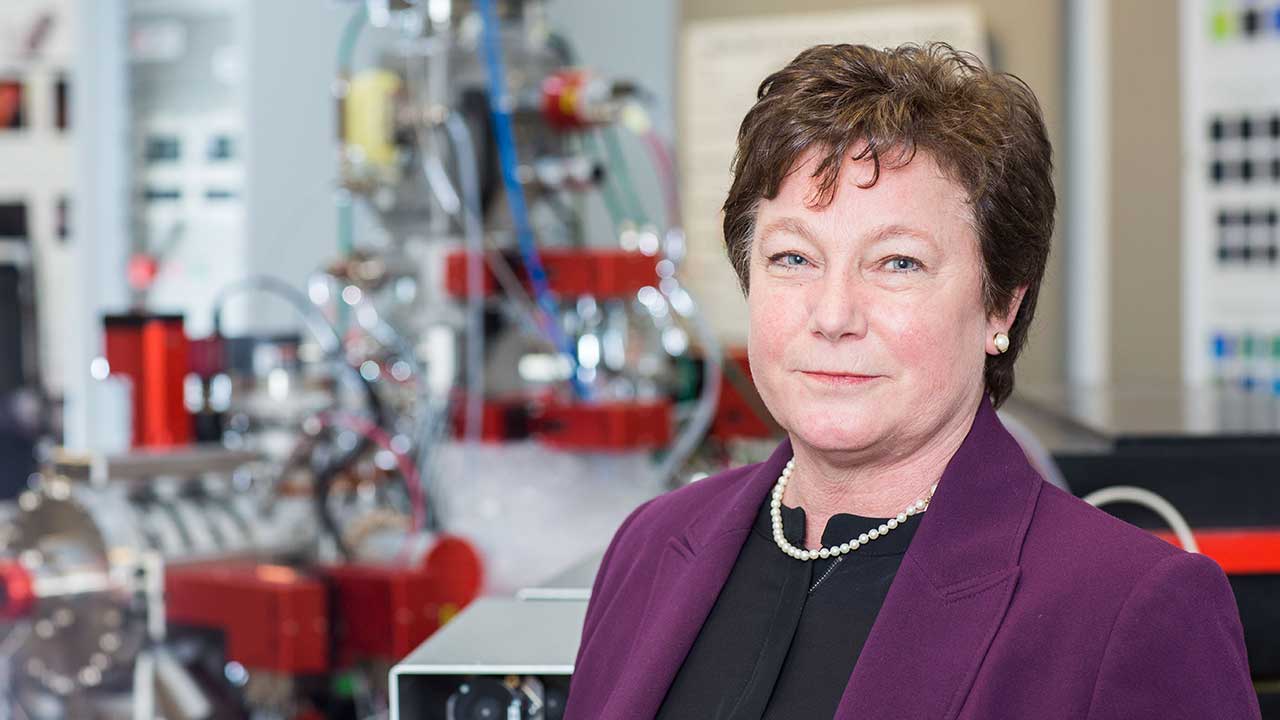Sowing seed grants for a harvest of medical discovery

Photo credit: Charlie Leight, ASU Now
What if the answer to fighting disease-causing bacteria in wounds, including treatment-resistant bacteria, could be found in the use of mud as medicine — a treatment that goes back to prehistoric times?
Researchers from Arizona State University and Mayo Clinic who come from distinctly different disciplines have found one type of clay, a blue-colored clay from the Oregon Cascades, to be highly antibacterial.
Lynda Williams is a geochemist and research professor in ASU’s School of Earth and Space Exploration, and Robin Patel, MD, is director of the Infectious Diseases Research Laboratory and chair of the Division of Clinical Microbiology at Mayo Clinic. This interdisciplinary team is shedding an intriguing new light on the clay’s surprising medicinal properties. Their early research shows the clay works against a broad spectrum of human pathogens, including antibiotic-resistant strains such as MRSA. The discovery could lead to alternative ways of treating persistent infections and diseases that are difficult to treat with antibiotics.
Williams’ and Dr. Patel’s project is one of eight pilot studies that will be explored through the 2020 Mayo Clinic and Arizona State University seed grant program. The seed funding will take their test tube research to the next level — to evaluate the effectiveness of antibacterial blue clay in combatting MRSA in medical experiments with mice. The researchers intend to use their findings to seek a National Institutes of Health research project grant.

Research Professor Lynda Williams. Photo credit: Deanna Dent
Since 2005, Mayo Clinic and ASU have provided seed funding to 102 new, interdisciplinary and translational joint research projects. The funding is provided by Mayo Clinic and Arizona State University Alliance for Health Care.
By launching novel research on a small scale, researchers have been able to attract funding needed for larger studies that may make a significant impact in their fields and improve patient care. One example is Ellen Green, an assistant professor in the College of Health Solutions and research affiliate at Mayo Clinic, who leverages both laboratory and framed field experiments to evaluate changes to clinician behavior from health care policy. She recently received a $1.9 million research project grant from the National Institute on Aging to advance her study, “A Simulation Study of the Medicare Access and CHIP Reauthorization,” which evaluates the impact of the federal statute that changes the payment system for doctors who treat Medicare patients.
The projects draw on the strengths of each institution by pairing researchers from Mayo Clinic and ASU.
“Mayo Clinic and ASU are committed to working together to advance discoveries in health care technology and delivery to further advance patient care,” said Hugo E. Vargas, MD, medical director of Mayo Clinic’s Office of Clinical Research in Arizona. “This seed grant program, developed 14 years ago, brings together collaborative teams that draw upon the respective strengths of Mayo and ASU researchers and physician-scientists to find solutions that address unmet patient needs.”
“The seed grant program between Mayo Clinic and ASU has been a pillar of the strong collaboration our institutions have developed over the past 14 years,” said Susan Pepin, MD, MPH, managing director of health and clinical partnerships at ASU. “At ASU, we continue to value our collaboration with Mayo Clinic while advancing research in critical areas to advance health. By pairing our researchers with Mayo Clinic’s clinicians-researchers, we ignite powerful skills and tools to discover innovative solutions within the health care space.”
The 2020 seed grant projects and lead investigators are:
“Unraveling the landscape of viruses (known and novel) and determining the virus-tumor associations in chronic lymphocytic leukemia patients”
Arvind Varsani, associate professor, ASU School of Life Sciences
Esteban Braggio, associate consultant, Mayo Clinic
“Robotic characterization of multidimensional ankle mechanics in multiple sclerosis patients”
Hyunglae Lee, assistant professor, ASU School for Engineering of Matter, Transport and Energy
Dean Wingerchuck, MD, professor and chair, Mayo Clinic
“Presurgical mapping for cognitive expertise using fMRI”
Samuel McClure, associate professor, Department of Psychology
Leslie Baxter, consultant, Mayo Clinic
“Adapting a smartphone-delivered self-management program and behavioral intervention for positive airway pressure therapy”
Megan Petrov, assistant professor, ASU Edson College of Nursing and Health Innovation
Lori Rhudy, RN, assistant professor, nurse scientist, Mayo Clinic
“Leveraging geochemical processes to combat drug-resistant bacteria”
Lynda Williams, research professor, ASU School of Earth and Space Exploration
Robin Patel, MD, professor, chair, Mayo Clinic
“VR SCENT: VR Smell Composition Engine to assess Neurological Trauma”
Brian Smith, professor, ASU School of Life Sciences
Jan Stepanek, MD, MPH, associate professor, Mayo Clinic
“Metabolic reprogramming of antigen-specific T cells for ovarian cancer immunotherapy”
Abhinav Acharya, assistant professor, ASU School for Engineering of Matter, Transport and Energy
Marion Curtis, assistant professor, Mayo Clinic
“Characterizing leading risk factors contributing to the racial disparity of gallbladder cancer incidence rate”
Valentin Dinu, associate professor, ASU College of Health Solutions
Ping Yang, MD, professor, Mayo Clinic
More Science and technology

ASU-led space telescope is ready to fly
The Star Planet Activity Research CubeSat, or SPARCS, a small space telescope that will monitor the flares and sunspot activity…

ASU at the heart of the state's revitalized microelectronics industry
A stronger local economy, more reliable technology, and a future where our computers and devices do the impossible: that’s the…

Breakthrough copper alloy achieves unprecedented high-temperature performance
A team of researchers from Arizona State University, the U.S. Army Research Laboratory, Lehigh University and Louisiana State…

